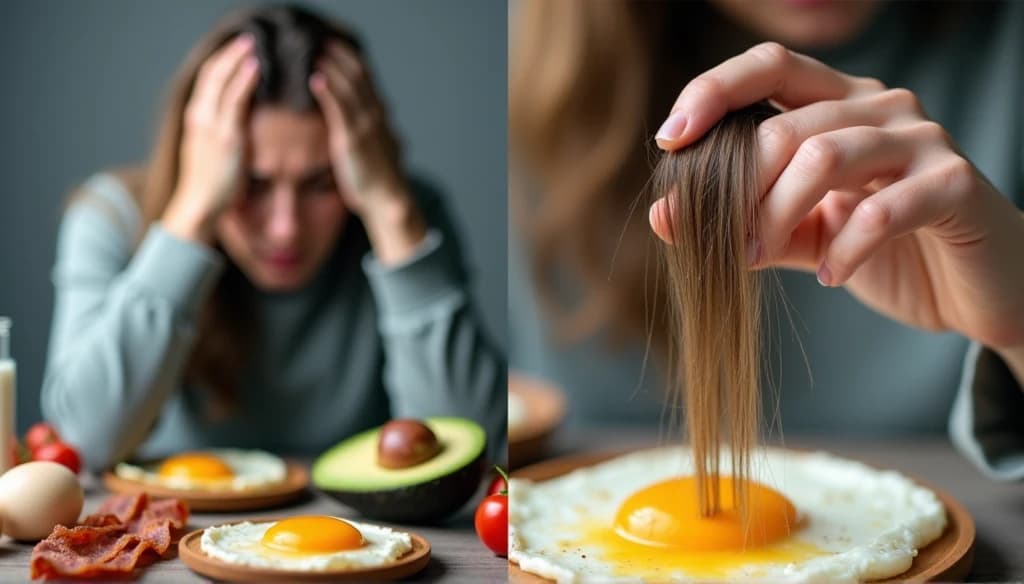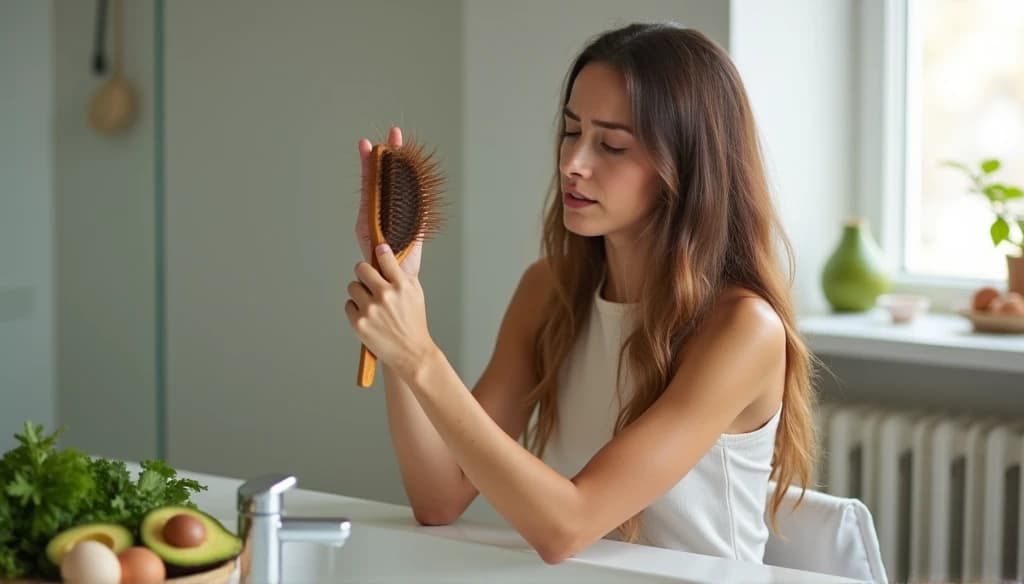Table of Contents
ToggleWhen I first started the ketogenic diet, I was excited about the promise of weight loss, mental clarity, and improved health. But what I didn’t expect was the emotional toll of brushing my hair one morning and noticing alarming clumps of it coming out. If you’re reading this, you may have experienced the same — and it’s terrifying. Why does the keto diet, which is supposed to improve your health, sometimes wreak havoc on your hair?
In this article, we’ll dive deep into why the keto diet might cause hair loss, how to prevent it, and what to do if you’re already losing hair. By the end, you’ll have a clear understanding of how to manage this frustrating issue while still reaping the benefits of keto.
What Causes Hair Loss on Keto?

Hair loss on the ketogenic diet is more common than you might think, especially during the first few months of transitioning to this high-fat, low-carb lifestyle. Below are the main reasons why this happens:
1. Nutritional Deficiencies
Cutting out entire food groups, such as grains and certain fruits, can lead to nutritional deficiencies. Your body might not be getting enough:
- Biotin: Essential for hair health.
- Zinc: Deficiency can weaken hair follicles.
- Iron: Low levels can cause thinning hair.
- Vitamin D: Important for hair growth cycles.
A lack of these nutrients can weaken your hair, leading to shedding and thinning.
2. Drastic Calorie Reduction
Many people unknowingly eat fewer calories when they start keto, as fat-rich meals tend to make you feel full. However, undereating can send your body into survival mode, prioritizing vital organs over non-essential functions like hair growth.
3. Telogen Effluvium (Stress-Induced Hair Loss)
The ketogenic diet is a major lifestyle change that can stress your body. This stress may trigger telogen effluvium, a condition where hair follicles prematurely enter the resting phase, leading to noticeable shedding.
4. Hormonal Changes
The keto diet influences hormones like insulin, cortisol, and thyroid hormones. Imbalances in these hormones can disrupt the hair growth cycle, leading to temporary or prolonged hair loss.
5. Dehydration and Electrolyte Imbalance
The keto diet’s diuretic effect causes the body to lose water and electrolytes rapidly, which can indirectly affect hair health. Without adequate hydration and minerals, your scalp and hair follicles may suffer.
How to Prevent Hair Loss on Keto

If you’re worried about losing hair on keto, don’t panic. There are several steps you can take to prevent or minimize the issue:
1. Ensure Nutritional Balance
To avoid deficiencies, focus on including nutrient-dense foods in your diet:
| Nutrient | Foods to Include on Keto |
|---|---|
| Biotin | Eggs, salmon, almonds, avocado |
| Zinc | Pumpkin seeds, shellfish, beef |
| Iron | Spinach, liver, red meat |
| Vitamin D | Fatty fish, fortified keto-friendly foods, sunlight |
Consider taking high-quality supplements if you suspect deficiencies.
2. Increase Protein Intake
While keto is a high-fat diet, adequate protein intake is critical for hair health. Aim for 0.6–1 gram of protein per pound of body weight daily.
3. Avoid Extreme Calorie Deficits
Ensure you’re eating enough calories to support your body’s needs. Use a keto calculator to determine your daily caloric requirements, and avoid eating significantly less than this amount.
4. Stay Hydrated and Balance Electrolytes
Drink plenty of water and replenish essential electrolytes like sodium, potassium, and magnesium. This helps maintain overall health, including healthy hair.
5. Manage Stress Levels
Adopting a new diet can be stressful, but chronic stress can worsen hair loss. Incorporate stress-reducing activities like:
- Yoga or meditation
- Gentle exercise
- Adequate sleep (7–9 hours per night)
How to Regrow Hair Lost on Keto

If you’ve already experienced hair loss on keto, don’t worry — in most cases, it’s temporary. Here’s how to encourage regrowth:
1. Reintroduce Missing Nutrients
Focus on a balanced keto diet that includes plenty of vitamins and minerals. You may also benefit from a multivitamin or hair-specific supplements like biotin or collagen peptides.
2. Consult a Healthcare Professional
If hair loss persists for more than six months, it may indicate an underlying issue unrelated to keto, such as thyroid problems or autoimmune disorders. A doctor can recommend blood tests to identify the root cause.
3. Consider Topical Treatments
Products like minoxidil (Rogaine) or natural oils (e.g., rosemary oil) can help stimulate hair growth if used consistently.
4. Stick with the Diet
It may sound counterintuitive, but quitting keto abruptly can worsen hair loss due to further hormonal disruption. Instead, focus on gradually improving your keto diet to address the hair loss.
Is Hair Loss on Keto Permanent?

The good news is that in most cases, keto-induced hair loss is not permanent. Once your body adapts to the diet (usually after 3–6 months) and you address any deficiencies, your hair growth should return to normal.
However, if you have underlying health issues or fail to address the root causes of hair loss, it may persist.
The Bottom Line: Keto and Hair Loss
While hair loss on keto can feel alarming, it’s often a temporary issue that resolves with proper nutrition and care. Don’t let this hurdle discourage you from pursuing a healthier lifestyle. By understanding the causes and taking proactive steps, you can minimize the impact and even regrow your hair over time.
Remember, every body is different. Pay attention to how your body responds to keto, and don’t hesitate to seek professional advice if needed. With the right approach, you can enjoy the benefits of keto without sacrificing your hair.
Final Thoughts:
If you’ve been saying, “Keto ruined my hair,” know you’re not alone. Many people experience this issue, but with the tips and solutions outlined in this article, you can take control of the situation and work toward healthier hair and a healthier you.
FAQ: Hair Loss and Keto
Why does keto cause hair loss?
Keto can cause hair loss due to nutritional deficiencies, stress, calorie restriction, hormonal changes, and dehydration.
How long does keto hair loss last?
Most people experience temporary hair loss that resolves within 3–6 months as the body adjusts to keto.
What vitamins should I take for hair loss on keto?
Key vitamins include biotin, zinc, iron, and vitamin D. A multivitamin or hair-specific supplement can help.
Can I prevent hair loss on keto?
Yes, by maintaining proper nutrition, staying hydrated, consuming enough calories, and managing stress, you can minimize hair loss.
Should I quit keto if I’m losing hair?
Not necessarily. Address the root causes of hair loss first. If the problem persists, consult a doctor to evaluate whether keto is right for you.





